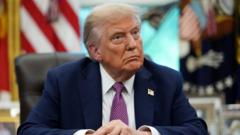Should the EU Impose 100% Tariffs on China and India to Pressure Putin?

Published: 2025-09-10 02:50:05 | Category: technology
The recent call by US President Donald Trump for the European Union to impose tariffs of up to 100% on China and India is a strategic move aimed at increasing economic pressure on Russia to end its ongoing war in Ukraine. This demand emerged during a meeting between US and EU officials focused on enhanced sanctions against Russia amidst intensifying attacks on Ukraine.
Last updated: 25 October 2023 (BST)
Key Takeaways
- Trump's proposal seeks to leverage tariffs against China and India to pressure Russia.
- The EU's current strategy focuses on sanctions rather than trade tariffs.
- Russia's recent missile strikes on Ukraine have escalated tensions and civilian casualties.
- Trade negotiations between the US and India are ongoing, with tariffs already imposed on Indian goods.
- China and India remain significant buyers of Russian oil, influencing their economic ties.
Background of the Situation
In the wake of Russia's aggressive military actions in Ukraine, US President Donald Trump has sought to explore new avenues for exerting pressure on Russian President Vladimir Putin. The potential implementation of significant tariffs on China and India is an attempt to disrupt the economic flow that sustains Russia's war efforts.
Trump's Tariff Proposal
During a recent meeting involving US and EU officials, Trump proposed imposing tariffs of as much as 100% on imports from China and India. This initiative aims to compel these countries to reconsider their trade relations with Russia, particularly regarding oil purchases. China and India are among the largest importers of Russian oil, which has been vital for keeping the Russian economy robust despite ongoing sanctions.
The European Union's Position
The EU has thus far focused on sanctions as its primary method for isolating Russia economically. The imposition of tariffs would signify a shift in strategy, indicating a more aggressive approach to addressing the situation. While the EU has committed to reducing its dependency on Russian energy, approximately 19% of its natural gas imports still come from Russia, complicating the decision to escalate trade tensions further.
The Impact of Recent Attacks in Ukraine
Recent missile strikes by Russia have resulted in substantial civilian casualties and destruction in Ukraine. Notably, a missile attack on Ukraine's main government building in Kyiv was seen as both a symbolic and aggressive move by the Kremlin. Over the past weekend, Ukraine experienced its heaviest aerial bombardment since the war's onset, with Russian forces reportedly deploying over 810 drones and 13 missiles.
Casualties and Humanitarian Concerns
On Tuesday, a further escalation occurred when more than 20 civilians lost their lives due to a Russian glide bomb in the eastern Donbas region while queuing for pensions. The humanitarian crisis in Ukraine continues to deepen, raising concerns about the impact of military actions on the civilian population.
Trump's Broader Strategy
In light of these developments, Trump has expressed frustration over the ongoing situation, indicating he is "not happy with the whole situation." He has threatened to impose harsher sanctions on Russia, although past threats have not resulted in significant action when Putin has ignored them. The lack of a resolution during a highly anticipated summit in Alaska last month further highlights the challenges in achieving peace.
US-India Trade Relations
In parallel to his proposal concerning tariffs on China and India, Trump has highlighted ongoing negotiations with India to address existing trade barriers. He intends to speak with Indian Prime Minister Narendra Modi in the coming weeks, aiming for a "successful conclusion" to their discussions. This dialogue is particularly critical given the recent imposition of a 50% tariff on goods from India, which also involved a penalty for transactions with Russia.
Global Economic Dynamics
The interdependence of global economies complicates the situation. China and India’s substantial purchases of Russian oil not only support the Russian economy but also reflect their strategic choices in energy procurement. The evolving landscape of international trade is closely tied to geopolitical interests, making it challenging for the US and its allies to navigate these relationships while enforcing sanctions.
Future Implications
If the EU decides to adopt Trump's proposal for tariffs, it would mark a significant shift in their approach to the Russian conflict. The implications for global trade could be profound, potentially leading to retaliatory measures from China and India and further complicating international relations. The effectiveness of tariffs in compelling Russia to change its course remains uncertain, as the situation continues to evolve.
Conclusion
The request for tariffs on China and India represents a strategic attempt by the US to escalate economic pressure on Russia amidst ongoing military aggression in Ukraine. As the international community watches these developments closely, the effectiveness of such measures in achieving peace remains to be seen. How will global powers navigate this complex web of economic dependencies and geopolitical tensions?
#TradeWars #USRussiaRelations #UkraineConflict
FAQs
What are the proposed tariffs on China and India by Trump?
Trump has proposed tariffs of up to 100% on imports from China and India as a means to increase economic pressure on Russia to end its war in Ukraine.
Why are China and India significant in this context?
China and India are major purchasers of Russian oil, which is crucial for sustaining the Russian economy under sanctions. Their trade relationships impact global economic dynamics.
What has been the recent military situation in Ukraine?
Ukraine has faced intensified attacks from Russia, including missile strikes that have resulted in civilian casualties and significant destruction, marking the heaviest bombardment since the war began.
How has the EU responded to the situation with Russia?
The EU has primarily focused on imposing sanctions against Russia rather than implementing trade tariffs, though the recent proposal from Trump suggests a potential shift in strategy.
What are the implications of US-India trade negotiations?
Ongoing negotiations between the US and India aim to address trade barriers, with recent tariffs already imposed on Indian goods. Successful discussions could influence trade relations amid the broader geopolitical situation.



